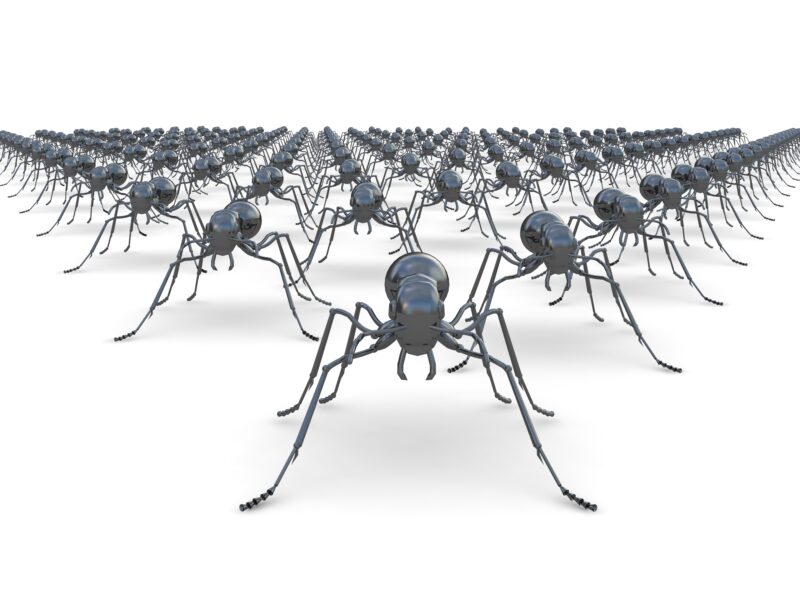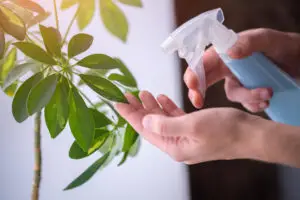Ants are the most commonly reported household pest with more than 50% of homeowners reporting problems. What may start out as a small ant problem can quickly turn from mild to severe in the blink of an eye because these pests rarely travel alone. They live, work, and travel in groups which means you cannot ignore the issue. Most people usually don’t realize they have a problem until it has already become a large-scale infestation.
Most ants are a harmless nuisance, but even the ‘harmless’ types can cause problems such as food contamination. Other types, like carpenter ants, can possibly cause structural damage to a home. Once you discover an infestation, you’ll want to identify the type of ant you’re dealing with and how they are getting into your house.
Most ant control products on store shelves consist of dangerous poisons and harmful chemicals; not the sort of things you want in your home. The good news is there are natural, environmentally sound ways to get rid of ants and keep them away from your house.
What Brings Them Inside?
First things first, why are ants attracted to your home? Knowing why they are there will help you find a solution to get them out. Here are a few reasons they may be coming in.
- Food – These pests need very little food around to be interested. Something as small as a few crumbs on the floor will get a worker ant excited.
- Water – Just like all other living creatures, they need water. Due to their small size, a little goes a long way.
- Shelter – Environmental factors will cause them to look for shelter. It may be the rainy season, an extremely hot drought, or snow that will cause them to come into your home.
- Easy Access – Ants may be taking over your house simply because it’s easy to do! Having a house sealed tight will greatly reduce your risk of an ant infestation.
8 Ways to Keep Ants Away From Your Home
Now that you know why they’re there, how do you get rid of them? Here are some steps to take to help remove ants from your home and prevent them from coming back.
- Clean up – Ants don’t need much to be intrigued. Cookies, fruit peels, crackers, casseroles, they’ll take anything. Deep cleaning your home is an important step. Sweep and vacuum floors at the end of each day, clean all the nooks and crannies, and be sure to pay close attention to the kitchen which is the area with the most food. If you can, keep all dining and cooking to just a couple easy to clean areas and wipe down countertops with white vinegar after every meal. This disrupts any pheromone trails that they leave behind for their buddies to follow.
- Use natural scents that repel ants – There are many DIY tips and natural home remedies to help keep ants away. Some of the most popular include using scents like peppermint oil and lemon to deter them. To make it easy for you, Stay Away® Ants & Cockroaches is an ant deterrent product that uses a blend of essential oils including peppermint oil, lemongrass, thyme oil, and more to get rid of ants and prevent them from returning. You can also try sprinkling a strongly scented herb or spice, like cayenne or cinnamon, around the entrance to their nest because they will sense danger and the entire colony will promptly find a new home.
Properly store pantry foods – It is best to store foods in reusable, sealed containers. Other tips include storing ripe fruits in the refrigerator instead of the counter or pantry and wiping down sticky syrup, honey, and condiment bottles. It could also help to sprinkle sugar outside your home because they’ll think they hit the jackpot and stick to the selections served outside.
- Properly store pet foods – While we are talking about human foods, we often forget that ants love pet foods as well. The large bags of dog food typically aren’t resealable. It is best to remove them from their original bag and put them in airtight containers. It’s also a good idea to clean up any mess from pet bowls each night.
- Check for moisture – These pests are drawn towards moisture and you may be surprised by how little water is needed for an ant. Something as small as a damp bathroom rug is appealing. Identify and repair any leaky roofs or pipes. Eliminate standing water in areas such as potted plants. Dry off as much as possible before exiting the shower and/or bath. Continue to run the bathroom fan for a while after you’re done showering to help reduce moisture levels.
- Seal your home – Ants are pretty tiny critters so it is difficult to completely close off all entry points. Any little bit will help, though! Replace any damaged screens on windows and doors. Look for small crevices and use a silicone-based caulk to plug them up. Repair any rotten wood around doors and window sills. Check areas like cable, phone, and internet wall ports that lead outside because they could get in there.
Clean and regularly check house plants – Other pests, like aphids and whiteflies, tend to like a lot of plants in and around the home (aphids love roses and clematis). They produce honeydew which ants love! Making a homemade solution of dish soap and water in a spray bottle and wiping down the leaves of your plants can help. If possible, remove plants that can attract these pests, such as peonies.
- Move piles of leaves, lumber, and mulch away – Don’t let an ant colony build a guest house right outside your door. Piles of lumber or leaves, as well as stacks of rocks or mulch, all look like dream homes from their perspective. Keep them far away from your home.
Other Methods
If the ants disappear for a few days but you notice them popping up in a different area of the house, you could have a full infestation on your hands. In that case, you may have to take further action.
Calling an Exterminator
If your pest problem is out of control, a pest control professional is a possible option. It’s good to look at reviews of local companies before choosing one. It’s common for exterminators to use ant bait and pesticides when they come to your home, so asking them questions to better understand the methods they will use and if any of them will put your family, pets, or other animals at risk is recommended.
Different stages of the ant life cycle, along with environmental factors like geographic region and local weather can make pests difficult to control. While Stay Away pouches have been tested and proven effective against some species of ants (Carpenter ants specifically), there are hundreds of different species in America alone. From Tampinoma Melanocephalum (ghost ants) to Monomorium Pharaonius (pharaoh ants), an exterminator can help determine which type you are dealing with. The best way to get rid of ants, or any household pest, may involve an integrated pest management approach.
Using Poison
Poisons and insecticides don’t repel ants; they kill them. We do not recommend ant killers because these insects are generally considered beneficial. They aerate the soil and feed on other insects which can become household pests.
This method also does not solve the problem because it doesn’t prevent other ants from returning. Pyrethrin and malathion are two of the most common types of ant poison.
What are pyrethrins?
Pyrethrins are pesticides found naturally in some chrysanthemum flowers. They are a mixture of chemicals that are toxic to insects. Mosquitoes, fleas, flies, moths, ants, and many other pests can be controlled using pyrethrins. Pyrethrins can be found in foggers (bug bombs), sprays, dusts, pet shampoos, and over-the-counter lice treatments.
What is malathion?
Malathion is an organophosphate. Thousands of products containing malathion are available for sale as powders, dusts, and sprays for pest control. Precautions must be taken when using products containing malathion to prevent adverse effects such as nausea, weakness, shortness of breath, cramps, headaches, and diarrhea. Malathion is also highly toxic to bees and other beneficial insects, some fish, and other aquatic life.
We do not recommend these methods.
Effective Pest Control
One of the best ways to get rid of ants is to discourage them from entering your home in the first place. In addition to sealing your home, keeping it clean, and removing their food sources, also consider investing in an ant repellent.
Stay Away® Ant & Cockroach deterrent is made from botanical ingredients. The scent of the pouches helps to repel ants by obscuring the scent trails they follow as well as the scent of the food they seek. They will leave the area to avoid the scent. Placing pouches in these areas after the pests are gone will also prevent them from returning in the future. Shop online or in a store near you.






 Properly store pantry foods
Properly store pantry foods Clean and regularly check house plants
Clean and regularly check house plants